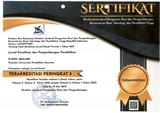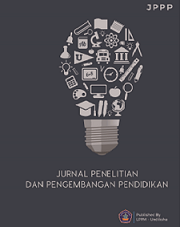The Waste Sorting Education Media: An Innovation with Android-based Game
DOI:
https://doi.org/10.23887/jppp.v7i3.67226Keywords:
Trash, Game, Android, Elementary SchoolAbstract
Knowledge of waste classification and segregation is very important considering that currently Indonesia is one of the largest plastic waste contributor countries in the world. Games that can be modified for educational purposes are educational games, especially in waste sorting. This study aims to develop an android-based waste sorting educational game (with the types of waste that appear in the school environment), as well as how to sort this android-based waste. Educational games are very appropriate as educational or learning media. Researchers use a research and development design or Research and Development Design (R&D) with the Borg and Gall model. In this initial study, it was carried out up to the small-scale user trial stage. The collection of teacher response data as a media user is carried out using an application usability instrument, namely the System Usability Scale (SUS). The research was conducted in 4 elementary schools. The educational game Sorting Trash was developed using Construct 3, Canva and Pixlr. This game is operated with an Android-based smart phone so that it is easily accessible to the wider community. The results of the validity test by media experts and material experts show that the results of the Android-based Sort Waste educational game are very valid, so they are very suitable for use as educational media for elementary school students.
References
Akker, J. van den, Bannan, B., Kelly, A. E., Nieveen, N., & Plomp, T. (2013). Educational Design Research. In Tjeerd Plomp & N. Nieveen (Eds.), Netherlands Institute for Curriculum Development: SLO (1st ed.). SLO • Netherlands institute for curriculum development.
Amasuomo, E., & Baird, J. (2016). The Concept of Waste and Waste Management. Journal of Management and Sustainability, 6(4), 88. https://doi.org/10.5539/jms.v6n4p88. DOI: https://doi.org/10.5539/jms.v6n4p88
Amir, M. F., Mufarikhah, I. A., Wahyuni, A., Nasrun, & Rudyanto, H. E. (2019). Developing ‘fort defending’ game as a learning design for mathematical literacy integrated to primary school curriculum in indonesia. Elementary Education Online, 18(3). https://doi.org/10.17051/ilkonline.2019.610145. DOI: https://doi.org/10.17051/ilkonline.2019.610145
Ardani, N. L. P., Dermawan, K. T., Arthana, I. K. R., & Putrama, I. M. (2020). The development of “i Sangging Lobangkara” balinese folklore as an android based game. Journal of Physics: Conference Series, 1516(1). https://doi.org/10.1088/1742-6596/1516/1/012012. DOI: https://doi.org/10.1088/1742-6596/1516/1/012012
Ayu, N., & Gayatri, G. (2023). Educational Game Design Sorting Waste Android Based. Ultima Infosys : Jurnal Ilmu Sistem Informasi, 14(1), 11–18. https://doi.org/10.31937/si.v14i1.3113.
Bastian, A., Awwaluddin, Y., Whydiantoro., & Budiman. (2020). Designing Environtment Care Adventure Game Based on Android Using Construct 2. Jurnal Mantik, 4(3), 1–7. https://doi.org/10.35335/mantik.Vol4.2021.1136.pp2311-2317.
Batubara, H. H. (2017). Pengembangan Media Pembelajaran Matematika berbasis Android untuk Siswa SD/MI. Jurnal Madrasah Ibtidaiyah, 3(1), 12–27. https://doi.org/10.31602/muallimuna.v3i1.952 DOI: https://doi.org/10.31602/muallimuna.v3i1.952
Fadella, E. F., Sugiarto, & Prabowo, A. (2018). Keefektifan Problem-Based Learning Berbantuan Komik Matematika terhadap Kemampuan Pemecahan Masalah dan Rasa Ingin Tahu. PRISMA (Prosiding Seminar Nasional Matematika), 77–86. https://journal.unnes.ac.id/sju/index.php/prisma/article/view/19573.
Fatimah, A. S., & Santiana, S. (2017). Teaching in 21St Century: Students-Teachers’ Perceptions of Technology Use in the Classroom. Script Journal: Journal of Linguistic and English Teaching, 2(2), 125. https://doi.org/10.24903/sj.v2i2.132. DOI: https://doi.org/10.24903/sj.v2i2.132
Fauzi, A., Rahmatih, A. N., Indraswati, D., & Sobri, M. (2021). Penggunaan Situs Liveworksheets untuk Mengembangkan Lkpd Interaktif di Sekolah Dasar. Jurnal Pengabdian Masyarakat, 2(3), 232–240. https://doi.org/10.37478/mahajana.v2i3.1277. DOI: https://doi.org/10.37478/mahajana.v2i3.1277
Febriyanti, I., Wahana, A., & Syah, F. (2023). Upgrade Games Cognitive And Literacy For Android - Based Kindergarten Children. Applied Science and Technology Reaserch Journal, 2(1), 19–29. https://doi.org/10.31316/astro.v2i1.5047. DOI: https://doi.org/10.31316/astro.v2i1.5047
Haleem, A., Javaid, M., Qadri, M. A., & Suman, R. (2022). Understanding the role of digital technologies in education: A review. Sustainable Operations and Computers, 3(February), 275–285. https://doi.org/10.1016/j.susoc.2022.05.004. DOI: https://doi.org/10.1016/j.susoc.2022.05.004
Hanifah, N. H., Walid, M., Putri, C. A., Sinta, L. N., & Ningrum, D. E. A. F. (2022). Development of Android-based “Pete” Educational Game to Improve Elementary School Student Learning Outcomes in Social Science Learning. Al Ibtida: Jurnal Pendidikan Guru MI, 9(2), 430. https://doi.org/10.24235/al.ibtida.snj.v9i2.11467. DOI: https://doi.org/10.24235/al.ibtida.snj.v9i2.11467
Hoffmann, G., & Pfeiffer, J. (2022). Gameful Learning for a More Sustainable World: Measuring the Effect of Design Elements on Long-Term Learning Outcomes in Correct Waste Sorting. Business and Information Systems Engineering, 64(4), 459–482. https://doi.org/10.1007/s12599-021-00731-x. DOI: https://doi.org/10.1007/s12599-021-00731-x
Insani Nurchintyawati. (2022). Android Based Educational Game in Learning and Teaching English Vocabulary. Journal of Applied Linguistics, 2(1), 13–18. https://doi.org/10.52622/joal.v2i1.44 DOI: https://doi.org/10.52622/joal.v2i1.44
Jazuli, M., Azizah, L. F., & Meita, N. M. (2018). Pengembangan Bahan Ajar Elektronik Berbasis Android Sebagai Media Interaktif. LENSA (Lentera Sains): Jurnal Pendidikan IPA, 7(2), 47–65. https://doi.org/10.24929/lensa.v7i2.22. DOI: https://doi.org/10.24929/lensa.v7i2.22
Kartini, Ketut Sepdyana., Putra, N. T. A. (2020). Pengaruh Penggunaan Media Pembelajaran Interaktif Berbasis Android Terhadap Hasil Belajar Siswa. Jurnal Pendidikan Kimia Dan Ilmu Kimia, 3(02), 8–12. https://doi.org/10.33627/re.v3i2.417. DOI: https://doi.org/10.33627/re.v3i2.417
Kartini, K. S., & Putra, I. N. T. A. (2020). Respon Siswa Terhadap Pengembangan Media Pembelajaran Interaktif Berbasis Android. Jurnal Pendidikan Kimia Indonesia, 4(1), 12. https://doi.org/10.23887/jpk.v4i1.24981. DOI: https://doi.org/10.23887/jpk.v4i1.24981
Kuswanto, J., & Radiansah, F. (2018). Media Pembelajaran Berbasis Android Pada Mata Pelajaran Sistem Operasi Jaringan Kelas XI. Jurnal Media Infotama, 14(1). https://doi.org/10.37676/jmi.v14i1.467. DOI: https://doi.org/10.37676/jmi.v14i1.467
Lai, C. H., Bin, S. J., T.H., Y., & Tsong, W. L. (2020). “Integrating Flash Cards with Narratives for Mobile Learning of English Vocabulary.” International Journal of Interactive Mobile Technologies, 14(4), 4–16,. https://doi.org/10.3991/IJIM.V14I04.11723. DOI: https://doi.org/10.3991/ijim.v14i04.11723
Lastari, D. S., & Silvana, R. (2020). the Effects of Summarizing Using Infographics on Efl Learners’ Reading Comprehension. Globish: An English-Indonesian Journal for English, Education, and Culture, 9(2), 128. https://doi.org/10.31000/globish.v9i2.2707. DOI: https://doi.org/10.31000/globish.v9i2.2707
Mariyanti, T. (2023). Development of Mobile Learning Applications for Android Based on Artificial Intelligence. International Transactions on Artificial Intelligence (ITALIC), 1(2), 230–235. https://doi.org/10.33050/italic.v1i2.333. DOI: https://doi.org/10.33050/italic.v1i2.333
Piotrowska, I., Cichoń, M., Sypniewski, J., & Abramowicz, D. (2022). Application of Inquiry-Based Science Education, Anticipatory Learning Strategy, and Project-Based Learning Strategies. In Didactic Strategies and Resources for Innovative Geography Teaching, 23–50. https://doi.org/10.4018/978-1-7998-9598-5.ch002. DOI: https://doi.org/10.4018/978-1-7998-9598-5.ch002
Qohar, A., Susiswo, Nasution, S. H., & Wahyuningsih, S. (2021). Development of Android-Based Mathematics Learning Game on the Topic of Congruence and Similarity. International Journal of Interactive Mobile Technologies, 15(9), 52–69. https://doi.org/10.3991/ijim.v15i09.20723. DOI: https://doi.org/10.3991/ijim.v15i09.20723
Rafique, H., Almagrabi, A. O., Shamim, A., Anwar, F., & Bashir, A. K. (2020). Investigating the acceptance of mobile library applications with an extended technology acceptance model (TAM). Computers & Education, 145, 103732. https://doi.org/10.1016/j.compedu.2019.103732. DOI: https://doi.org/10.1016/j.compedu.2019.103732
Rahmayanti, H., Oktaviani, V., & Syani, Y. (2020). Development of sorting waste game android based for early childhood in environmental education. Journal of Physics: Conference Series, 1434(1). https://doi.org/10.1088/1742-6596/1434/1/012029. DOI: https://doi.org/10.1088/1742-6596/1434/1/012029
Rahmayanti, Henita, Ichsan, I. Z., Oktaviani, V., Syani, Y., Hadi, W., & Marhento, G. (2020). Environmental attitude for smart city technology: Need assessment to develop smart trash in environmental education. International Journal of Advanced Science and Technology, 29(3), 8374–8383. https://www.researchgate.net/profile/Ilmi-Ichsan/publication/340754880_Environmental_Attitude_for_Smart_City_Technology_Need_Assessment_to_Develop_Smart_Trash_in_Environmental_Education/links/5e9bd4a692851c2f52ae6458/Environmental-Attitude-for-Smart-City-Technology-Need-Assessment-to-Develop-Smart-Trash-in-Environmental-Education.pdf.
Rohmah, F. N., & Bukhori, I. (2020). Pengembangan Media Pembelajaran Interaktif Mata Pelajaran Korespondensi Berbasis Android Menggunakan Articulate Storyline 3. ECOEDUCATION (Economic & Education Journal), 2(2), 169–182. https://doi.org/10.33503/ecoducation.v2i2.892. DOI: https://doi.org/10.33503/ecoducation.v2i2.892
Sari, S., Anjani, R., Farida, I., & Ramdhani, M. A. (2017). Using Android-Based Educational Game for Learning Colloid Material. Journal of Physics: Conference Series, 895(1). https://doi.org/10.1088/1742-6596/895/1/012012. DOI: https://doi.org/10.1088/1742-6596/895/1/012012
Satria, E., Fitriani, L., Muhsin, Y. S., & Tresnawati, D. (2021). Development of educational games for learning waste management. IOP Conference Series: Materials Science and Engineering, 1098(3), 032064. https://doi.org/10.1088/1757-899x/1098/3/032064. DOI: https://doi.org/10.1088/1757-899X/1098/3/032064
Singh., P., & Prasad Singh, M. (2021). The Role of Teachers in Motivating Students to Learn. LEARN An International Journal of Educational Technology Techno, 11(1), 2021. https://doi.org/10.30954/2231-4105.01.2021.6. DOI: https://doi.org/10.30954/2231-4105.01.2021.6
Sugiyono. (2015). Meode Penelitian & Pengembangan: Research and Development. Alfabeta.
Uska, M. Z., Wirasasmita, R. H., Arianti, B. D. D., Kholisho, Y. N., Djamaluddin, M., & Jamaluddin, J. (2021). Android-Based Waste Education App: An Information Media on Zero-Waste Programs. Elinvo (Electronics, Informatics, and Vocational Education), 6(1), 16–25. https://doi.org/10.21831/elinvo.v6i1.41104. DOI: https://doi.org/10.21831/elinvo.v6i1.41104
Wardani, S., Lindawati, L., & Kusuma, S. B. W. (2017). The development of inquiry by using android-system-based chemistry board game to improve learning outcome and critical thinking ability. Jurnal Pendidikan IPA Indonesia, 6(2), 196–205. https://doi.org/10.15294/jpii.v6i2.8360. DOI: https://doi.org/10.15294/jpii.v6i2.8360
Widiyatmoko, A., Taufiq, M., Purwinarko, A., Wusqo, I. U., & Darmawan, M. S. (2022). The Effect of Environmental Pollution Game-Based Learning on Improving Students’ Conceptual Understanding and Environmental Awareness. Journal of Innovation in Educational and Cultural Research, 3(4), 691–700. https://doi.org/10.46843/jiecr.v3i4.344. DOI: https://doi.org/10.46843/jiecr.v3i4.344
Yasin, A. I., Prima, E. C., & Sholihin, H. (2018). Learning Electricity using Arduino-Android based Game to Improve STEM Literacy. Journal of Science Learning, 1(3), 77. https://doi.org/10.17509/jsl.v1i3.11789. DOI: https://doi.org/10.17509/jsl.v1i3.11789
Yustriani, A., & Zulfiani. (2023). Development of Android Based Educational Games as Learning Media on the Concept of Coordination System for Grade XI High School Students Avina Yustriani , Zulfiani *. Jurnal Pendidikan Sains Indonesia, 11(3), 608–624. https://doi.org/10.24815/jpsi.v11i3.30656. DOI: https://doi.org/10.24815/jpsi.v11i3.30656
Downloads
Published
How to Cite
Issue
Section
License
Copyright (c) 2023 Afiani Purnaningtyas

This work is licensed under a Creative Commons Attribution-ShareAlike 4.0 International License.
Authors who publish with the Jurnal Penelitian dan Pengembangan Pendidikan agree to the following terms:
- Authors retain copyright and grant the journal the right of first publication with the work simultaneously licensed under a Creative Commons Attribution License (CC BY-SA 4.0) that allows others to share the work with an acknowledgment of the work's authorship and initial publication in this journal.
- Authors are able to enter into separate, additional contractual arrangements for the non-exclusive distribution of the journal's published version of the work (e.g., post it to an institutional repository or publish it in a book), with an acknowledgment of its initial publication in this journal.
- Authors are permitted and encouraged to post their work online (e.g., in institutional repositories or on their website) prior to and during the submission process, as it can lead to productive exchanges, as well as earlier and greater citation of published work. (See The Effect of Open Access)







